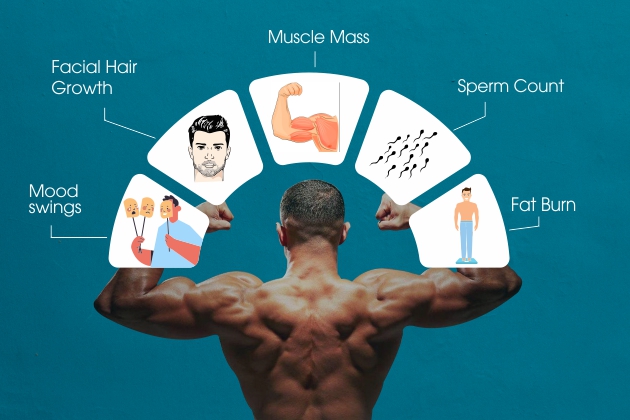Health
Why is Testosterone Essential for Men?

Testosterone is a sex hormone that serves as a chemical messenger in the body. Men have significantly higher levels of testosterone than women, and it is their main sex hormone. Testosterone is primarily associated with masculine traits such as bone and muscle development, facial hair, deeper voice, and reasoning.

What is the Functions of Testosterone in Men?
Testosterone is mainly responsible for masculinization, developing boys through puberty, and increasing sex drive, assertiveness, and physical strength. However, balanced testosterone levels in men and women are necessary to regulate mood and overall body function. Here are a few important things testosterone helps maintain:
1. Sleep – Sleep supports healthy testosterone production. In turn, balanced testosterone levels support melatonin production which promotes regular sleep cycles. Low testosterone can lead to sleep disturbances, insomnia, and lower sleep quality.
2. Energy – Testosterone contributes to stable energy levels by increasing red blood cell production which improves oxygen delivery to muscles and tissues. This increases overall strength, energy, endurance, and physical and mental stamina.
3. Metabolism – Testosterone supports metabolic activity and regulates body composition by simultaneously causing muscle growth and fat reduction.
4. Brain and Memory – Testosterone receptors are present in the brain in areas that support memory and concentration. Healthy testosterone levels support recall ability, focus, clarity, sharpness, black-and-white reasoning, and overall cognitive function.
5. Mental State – Testosterone supports confidence, resilience, and mood stabilization. It also assists the intellectual understanding and use of rules-based systems and helps with spatial reasoning and visualization. Low levels can lead to feelings of fatigue, low motivation, irritation, and depression or anxiety.
6. Heart Health – Balanced testosterone levels support cardiovascular health by regulating blood pressure, reducing cholesterol, and stimulating blood flow.
7. Muscles and Bones – Testosterone is most well-known for its ability to increase muscle size and strength by stimulating protein synthesis. It also improves the density, mineral absorption, and structural integrity of bones and the skeletal system.
8. Fertility – Testosterone is necessary for sex drive and spermatogenesis – the production of sperm. It also develops the penis, testes, and pubic hair in boys during childhood and puberty.
9. Sexual Functions – Testosterone is mainly a male hormone, but it affects sex drive, arousal, and performance in both men and women. Low testosterone is linked to erectile dysfunction and the risk of prostate cancer and enlargement.

High Testosterone Levels and Testosterone Deficiency
Both excessively high and excessively low testosterone levels can cause severe health problems in men and women. Fortunately, both conditions can be treated regardless of sex.
Excessively high testosterone levels can occur naturally or through steroid and substance abuse. Health problems associated with overly high testosterone levels include low sperm count and shrinking testes (as the body attempts to rebalance), increased risk of heart attack and blood clots, prostate enlargement and cancer, liver disease, acne, swelling, elevated blood pressure and cholesterol, insomnia, headaches, and potentially significant mood swings, mental delusions, and overly aggressive behavior.
Low testosterone is more common and is often referred to as “Low T”. This problem mainly affects men as they get over the age of 30 and don’t take the proper care to support their natural testosterone production. Some of the risks associated with low testosterone include:
1. Generalized Weakness – Low testosterone levels will lead to a decrease in muscle size and strength, as well as a weakening of bone structure. This creates less energy and strength for performing daily physical tasks.
2. Low Energy – Low testosterone will inhibit metabolism and overall strength. This will reduce overall energy levels and lead to lethargy and low motivation.
3. Disabling Frailty – Low testosterone weakens muscles, bones, metabolism, focus and confidence, and heart health. This leads to a general susceptibility to other illnesses and injuries, and an inability to function effectively.
4. Depression – Low testosterone leads to mood dysregulation and neurotransmitter imbalances. This causes sadness, despair, and disinterest in life and joyful activities.
5. Problems with Sexual Function – Low testosterone decreases sex drive, performance, and satisfaction. It can also lead to erectile dysfunction and other sexual inabilities.
6. Problems with Cognition – Testosterone receptors exist in the brain and low levels impair memory, focus, clarity, concentration, reasoning, and overall cognitive performance.
Fortunately, low testosterone levels can be treated with testosterone replacement therapy. Synthetic testosterone can be administered through injections, gels, or skin patches to bring levels back to healthy norms. While testosterone replacement therapy is typically recommended for men, it can be beneficial for women as well in certain circumstances.
There are many options for treating testosterone deficiency in individuals of all ages. For example, discover depo testosterone for sale, and other options of testosterone injection to get the fastest results with the fewest side effects. Treating low testosterone is an important personal decision, and it’s important to evaluate all available methods to get the best possible results.

Testosterone in Conclusion
Testosterone is often caricatured as the “roid rage” hormone used by bodybuilders, dishonest pro athletes, and other overly-aggressive individuals. However, the truth is that it is a vital, sensitive biological hormone that plays a key, natural role in maintaining balance and harmony in the bodies of men, women, and children.
Testosterone levels must be closely monitored with blood tests when an issue is suspected, and treatment should only occur under strict medical supervision. There is no need to suffer the ill effects of testosterone imbalance. Explore testosterone treatment today to see if it’s right for you!
Health
Report Causes Pfizer Stock to Climb Approximately $1 Billion Acquired by Starboard

(VOR News) – According to a rumor that activist investor Pfizer Starboard Value has taken a holding in the struggling pharmaceutical business that is expected to be worth around one billion dollars, the stock of Pfizer (PFE) is on the increase in premarket trading on Monday.
This comes after the report was made public. The report was made available to the general public following this. Starboard Value was successful in moving forward with the acquisition of the position.
Starboard is said to have approached Ian Read, a former chief executive officer of Pfizer, and Frank D’Amelio, a former chief financial officer, in order to seek assistance with its goals of boosting the performance of the company, according to the Wall Street Journal. Read and D’Amelio are both former Pfizer executives.
The purpose of this is to facilitate the accomplishment of its objectives, which include enhancing the overall performance of the firm.
In their previous jobs, D’Amelio and Read were chief financial officers.
It is stated in the report that the hedge fund is of the opinion that Pfizer, which is currently being managed by Albert Bourla, who succeeded Read as Chief Executive Officer (CEO) in 2019, does not demonstrate the same level of mergers and acquisitions (M&A) discipline that Read did. Bourla took over for Read in 2019. Read was succeeded by Bourla in the year 2019.
Pfizer, a multinational pharmaceutical conglomerate, has made substantial investments in the acquisition of more companies that are involved in the research and development of cancer medicines.
These businesses have been acquired for billions of dollars. The biotechnology company Seagen, which was acquired by Pfizer in the previous year for a price of $43 billion, is included in this category. One of the businesses that can be classified as belonging to this category is Seagen.
In spite of the fact that the S&P 500 Index experienced a 21% increase in 2024.
No major trading occurred in Pfizer stock that year.
Due to the fact that the demand for Pfizer’s COVID-19 vaccines fell after the firm reached its pandemic peak in 2021, the share price of the corporation has decreased by over fifty percent since that time.
This drop has occurred ever since the company’s shares reached their maximum peak, which was during the time that this decline occurred. Not only have they not changed at all, but they have also remained essentially stable. This is in contrast to the S&P 500, which has gained 21% since the beginning of this year.
Recently, the corporation was forced to take a hit when it decided to recall all of the sickle cell illness medications that it had distributed all over the world.
Fears that the prescription could lead patients to experience severe agony and possibly even death were the impetus for the decision to recall the product. In spite of the fact that Pfizer’s stock is increasing by almost three percent as a result of the news that followed the company’s decision, this is the circumstance that has come about.
SOURCE: IPN
SEE ALSO:
New Study Reveals Drinking Soda Pop Increases the Risk of Stroke
The Mpox Vaccine’s Protection Decreases Within a Year; Booster Requirements
Health
New Study Reveals Drinking Soda Pop Increases the Risk of Stroke

A recent report from global research indicates that excessive consumption of coffee or soda pop is associated with an increased risk of stroke, although the intake of black and green tea is correlated with a reduced risk. Excessive consumption of soda pop or coffee warrants caution!
Recent research indicates that it may substantially elevate the risk of stroke.
Consuming four cups of coffee daily elevates the risk of stroke, according to studies, although ingesting 3-4 cups of black or green tea daily typically offers protection against stroke. Additionally, consume more coffee; it may reduce your risk of mortality.
Recent findings from global research studies co-led by the University of Galway and McMaster University, alongside an international consortium of stroke researchers, indicate that soda, encompassing both sugar-sweetened and artificially sweetened variants such as diet or zero sugar, is associated with a 22 percent heightened risk of stroke. The risk escalated significantly with the consumption of two or more of these beverages daily.
Stroke Risk Fizzy Drinks and Soda Pop
The correlation between fizzy drinks consumption and stroke risk was most pronounced in Europe, the Middle East, Africa, and South America. Women exhibit the most elevated risk of stroke from bleeding (intracranial hemorrhage) associated with fruit juice beverages. Consuming over 7 cups of water daily diminishes the likelihood of stroke due to a clot.
Researchers observed that numerous items advertised as fruit juice are derived from concentrates and have added sugars and preservatives, potentially negating the advantages often associated with fresh fruit and instead elevating stroke risk.
Fruit juice beverages were associated with a 37 percent heightened risk of stroke resulting from bleeding (intracranial hemorrhage). Consuming two of these beverages daily increases the risk thrice.
Consuming over four cups of coffee daily elevates the risk of stroke by 37 percent, although lower consumption levels do not correlate with stroke risk. Conversely, tea consumption was associated with an 18-20 percent reduction in stroke risk. Additionally, consuming 3-4 cups daily of black tea, such as Breakfast and Earl Grey varieties, excluding green and herbal teas, was associated with a 29 percent reduced risk of stroke.
Consuming 3-4 cups of green tea daily was associated with a 27 percent reduction in stroke risk. Notably, the addition of milk may diminish or inhibit the advantageous effects of antioxidants present in tea. The lower risk of stroke associated with tea consumption was negated for individuals who added milk.
Disclaimer: This article is intended solely for informational reasons and should not be considered a replacement for professional medical counsel. Consistently consult your physician regarding any inquiries pertaining to a medical problem.
Related News:
Starbucks Faces Sales Decline Amid Price Fatigue and Rising Competition
Starbucks Faces Sales Decline Amid Price Fatigue and Rising Competition
Health
Following a Diagnosis of Breast Cancer, What Else Should You Know?

(VOR News) – Even though breast cancer affects one in eight American women, receiving a diagnosis can make a woman feel isolated.
Experts in breast cancer from the American College of Physicians (ACS) advise patients on how to manage their disease so that they may better cope with this awful information.
First, the kind and stage of breast cancer dictates the course of your care.
In addition to immunotherapy and chemotherapy, there are various surgical options available for the treatment of breast cancer.
Women of African descent are disproportionately affected by triple-negative breast cancer, an extremely aggressive form of the disease that has never proven easy to treat.
According to the American Cancer Society, pembrolizumab (Keytruda), an immunotherapy, has been shown to be helpful when combined with chemotherapy and is currently the recommended course of treatment for certain combinations of triple-negative breast cancer.
In her presentation, Dr. Katharine Yao said, “It’s really important that the patient and physician discuss the patient’s preferences and values when deciding what type of treatment to pursue and that they have an honest, individualized discussion with their care team.”
She is currently responsible for developing breast cancer treatment recommendations for more than 575 hospitals and institutions nationwide in her role as chair of the American College of Surgeons’ National Accreditation Program for Breast Institutions (NAPBC).
Yao, vice chair of research at Endeavor Health NorthShore Hospitals in New York, pointed out that each decision made about a patient’s treatment plan should take her preferences and diagnosis into consideration.
She ought to think about whether she would prefer a mastectomy—a surgical procedure that involves removing the entire breast with or without reconstruction—or a lumpectomy, which involves a surgical procedure that spares part of the breast tissue.
She stated that “the breast cancer you have may be very different from the breast cancer you hear about in your neighbor, colleague, or friend” in a press release issued by the American Cancer Society (ACS).
“Consider that while discussing breast cancer with others.”
Throughout your journey, it is critical that you look after your emotional health because having breast cancer may have a detrimental impact on your mental health.
“Getting a cancer diagnosis does not mean that everything in your life stops to be normal.” Director of the Fellowship in the Diseases of the Breast program at the Winthrop P. Rockefeller Cancer Institute at the University of Arkansas and state head of the American Cancer Society Commission on Cancer for Arkansas, Dr. Daniela Ochoa She thinks adding the burden of a cancer diagnosis and treatment to all the other pressures in life may be taxing.
“Managing stress and emotional health is vital component of a treatment plan.”
Ochoa recommends clinically trained psychologists and social workers who have assisted people in coping with cancer to anyone receiving treatment. Learning coping techniques might also be facilitated by joining cancer support groups or cancer wellness initiatives.
Breast cancer specialists say your care team is crucial.
The American Cancer Society (ACS) defines comprehensive care as having support at every stage of the procedure from surgeons, oncologists, patient navigators, nurses, social workers, psychologists, and other specialists.
After receiving a breast cancer diagnosis, women should see a surgeon or medical oncologist to explore their options; nevertheless, treatment shouldn’t be discontinued after just one appointment or after surgery is over.
Additionally, you can ask trustworthy friends or family members to accompany you to appointments and aid you with research or notes. They could serve as a network of support for you.
Yao stated in his talk that “one of the most important things is that patients should search out a team they have confidence in, that they trust will have their back when they need it, and a team they feel they can get access to and that will help them when they are in need.”
SOURCE: MP
SEE ALSO:
The Mpox Vaccine’s Protection Decreases Within a Year; Booster Requirements
COVID was a Paradigm Shift in Health Policymaking, Says Commissioner Stella Kyriakides.
Rwanda Reports 8 Deaths Linked To Ebola-Like Marburg Virus Days After It Declared An Outbreak
-

 News3 years ago
News3 years agoLet’s Know About Ultra High Net Worth Individual
-
Entertainment1 year ago
Mabelle Prior: The Voice of Hope, Resilience, and Diversity Inspiring Generations
-

 Health3 years ago
Health3 years agoHow Much Ivermectin Should You Take?
-

 Tech2 years ago
Tech2 years agoTop Forex Brokers of 2023: Reviews and Analysis for Successful Trading
-

 Lifestyles2 years ago
Lifestyles2 years agoAries Soulmate Signs
-

 Health2 years ago
Health2 years agoCan I Buy Ivermectin Without A Prescription in the USA?
-

 Movies2 years ago
Movies2 years agoWhat Should I Do If Disney Plus Keeps Logging Me Out of TV?
-

 Learning2 years ago
Learning2 years agoVirtual Numbers: What Are They For?
